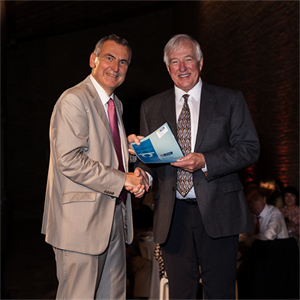 Dr. Robert E. Skelton, TEES Distinguished Research Professor in the Department of Aerospace Engineering at Texas A&M University, received the IFAC Fellow Award from the International Federation of Automatic Control (IFAC) at the IFAC 2017 World Congress in Toulouse, France.
Dr. Robert E. Skelton, TEES Distinguished Research Professor in the Department of Aerospace Engineering at Texas A&M University, received the IFAC Fellow Award from the International Federation of Automatic Control (IFAC) at the IFAC 2017 World Congress in Toulouse, France.
The IFAC Fellows Award is given to people who have made outstanding and extraordinary contributions in the field of interest of IFAC, in the role as engineer/scientist, technical leader or educator. Skelton received the award for his contributions to model reduction, robust control and integration of structure and control design.
For more than 50 years, Skelton’s research has focused on integrating system science with material science to create new material systems. His papers have explained the tensegrity nature of the cytoskeleton of red blood cells and of the molecular structure of nature’s strongest tensile material, the spider fiber. The ability to adapt allows tensegrity to produce materials systems that can modify their acoustic, electromagnetic or mechanical properties. In addition, tensegrity structures may include built-in actuators, sensors and power-storage devices. This versatility makes tensegrity an attractive alternative to conventional design.
Skelton is a member of the National Academy of Engineering. He is a Fellow of the Institute of Electrical and Electronics Engineers, a Fellow of the American Institute of Aeronautics and Astronautics, a co-recipient of the Normal Medal of the American Society of Civil Engineers and a life member of the Alexander von Humboldt Foundation (a non-profit foundation in Germany established to promote cooperation in international research), as well as having received the Senior Scientist Award from the Japan Society for the Promotion of Science.
He has published four books; “Model Error Concepts and Compensation” (1986), “Dynamic Systems Control” (1988), “A Unified Algebraic Approach to Control Design” (1996), and “Tensegrity Systems” (2009).